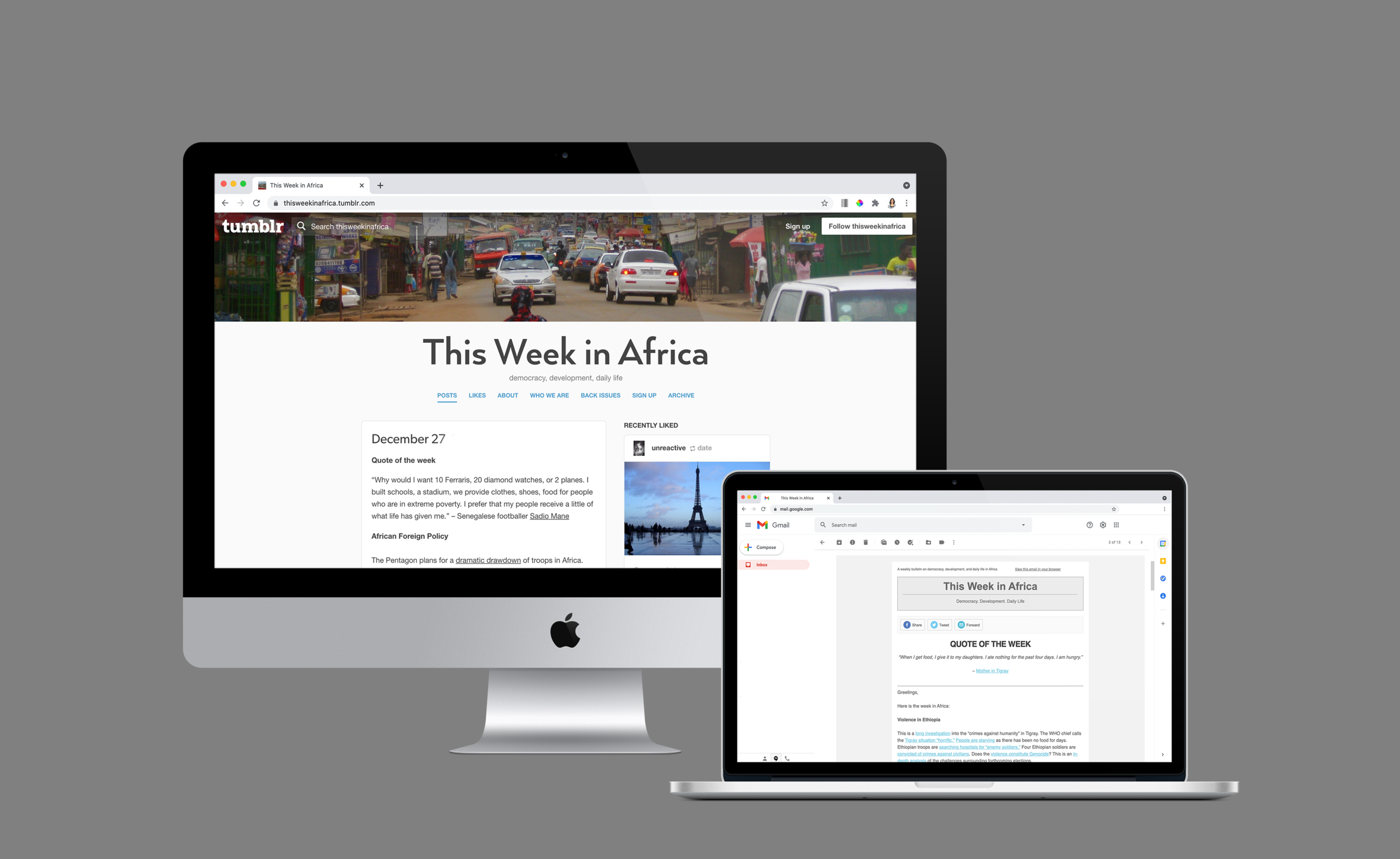What is This Week in Africa?
This Week in Africa (TWiA) is a weekly bulletin that curates news about democracy, development, and daily life across Africa. These concepts are often observed and analyzed separately, yet they are central to African societies. TWiA is delivered every Friday to subscribers’ inbox, and posted on its Tumblr page.
As students of politics, we attempt to place the continent’s diversity in its political context. By focusing on democracy, development, and daily life, we believe that we can inform the public about the changes taking place across Africa, as well as the resistant trends that largely stay the same.
Sign up for This Week in Africa here.
A diverse continent
Africa is a big continent, with diverse political, social, and economic challenges. But its 54 countries also have a lot of similarities, from persistent underdevelopment and struggles for democratic freedoms to creative cultures and impressive economic innovations. TWiA focuses on the successes and challenges facing African societies.
News about Africa often pegs the continent in a negative light, emphasizing war, poverty, disease, and corruption. Others espouse an “Africa Rising” narrative that focuses on the positive and emerging trends that might transform the continent. TWiA takes a middle path. We admit and analyze the dangerous challenges that remain, while we also acknowledge and report on the potentially revolutionary changes happening across the continent.
Beyond the ivory tower
TWiA does not provide answers; nor does it contain original content. Instead, we hope that the bulletin motivates you to think about Africa in a new way. By placing the news in its political context, we introduce readers to major debates taking place in Academia.
The bulletin also helps scholars stay up-to-date on Africa’s constantly changing political landscape. Alternatively, it highlights new academic research, providing an outlet for scholars to reach a non-academic audience.
By providing a scholarly perspective to Africa’s current events, TWiA attempts to inform government workers, development experts, political activists, and foreign policy advisers. TWiA curates dozens of international and Africa-based news outlets, highlighting the stories that might be most relevant to policymakers today.
In the classroom
TWiA is a valuable teaching device. For students, it provides weekly news stories for major themes covered in courses on African studies, African politics, and African development. For professors, the bulletin is a one-stop-shop for incorporating current events into lectures and course materials.
The newsletter targets students of African politics and society; professors of the humanities and social sciences with an interest in Africa; and policymakers working in Africa or on issues concerning the continent. TWiA is not written solely for a US audience. Rather, it also has readers across the globe, particularly in Africa.
What questions drive TWiA?
TWiA asks big questions that are at the heart of social science research on Africa. Why are many African countries poor? Why do some countries develop more rapidly than others? Why are some African societies peaceful, while others are mired in conflict? Why do some countries democratize while others remain authoritarian? What conditions foster sustainable economic and political development across the continent? What is the role of the international community in promoting democratization and fostering inclusive development?
We are motivated by a desire to explain the roots of political power, institutions, and human development in Africa. To do so, TWiA pays close attention to African elections, social movement struggles for rights and freedoms, investments and innovations in economies, and cultural adaptations and the role of ordinary people in the construction of political life.
A partnership
Most importantly, TWiA is a partnership. Jeff is a scholar of African politics; Phil was an undergraduate student majoring in Environmental Studies, and now is a Senior Project Associate at The Trust for Public Land. Jeff is American; Phil is from Zimbabwe. Jeff started the bulletin in his “Introduction to African Politics and Society” course at Bates College, where Phil was his student.
While Jeff enjoyed working on the content, Phil had a larger vision. As a member of the African diaspora, Phil looked to the email in his inbox each Friday as a way to stay-up-to-date on what was happening back home. But Phil wanted a more intentional product, and hoped to reach a larger audience. He also wanted a more professional and modern-looking publication.
After meeting several times the summer of 2015 in Harlem, the partnership was formed.
